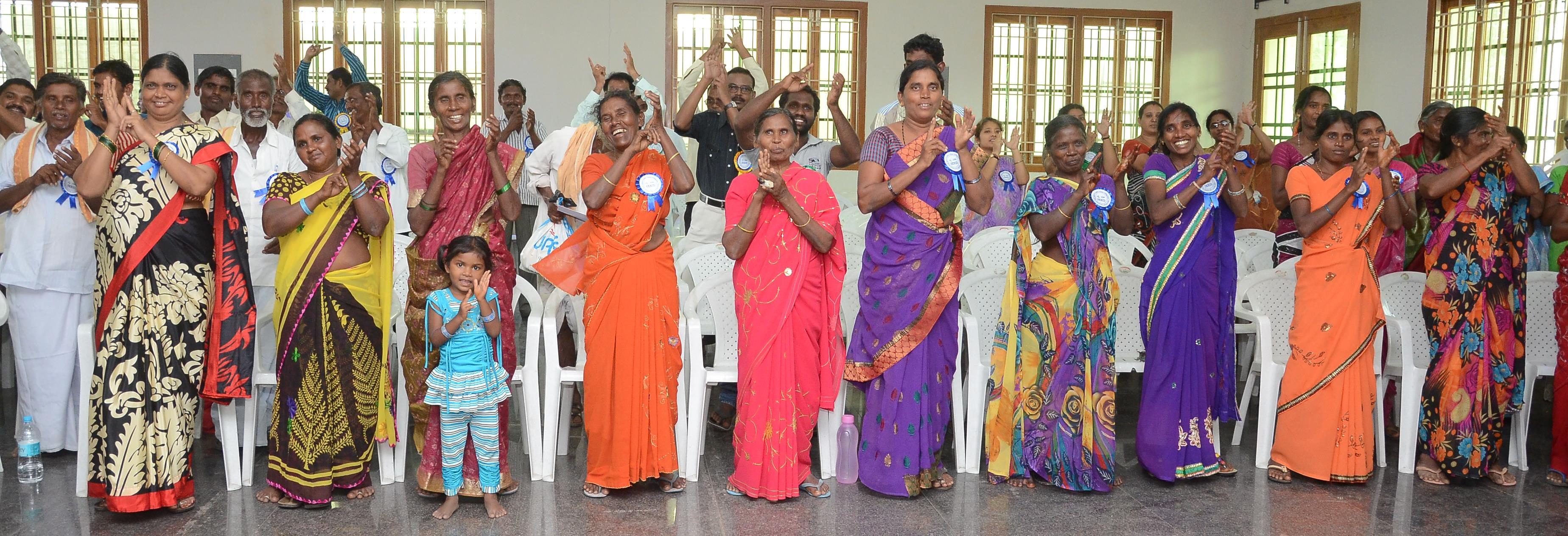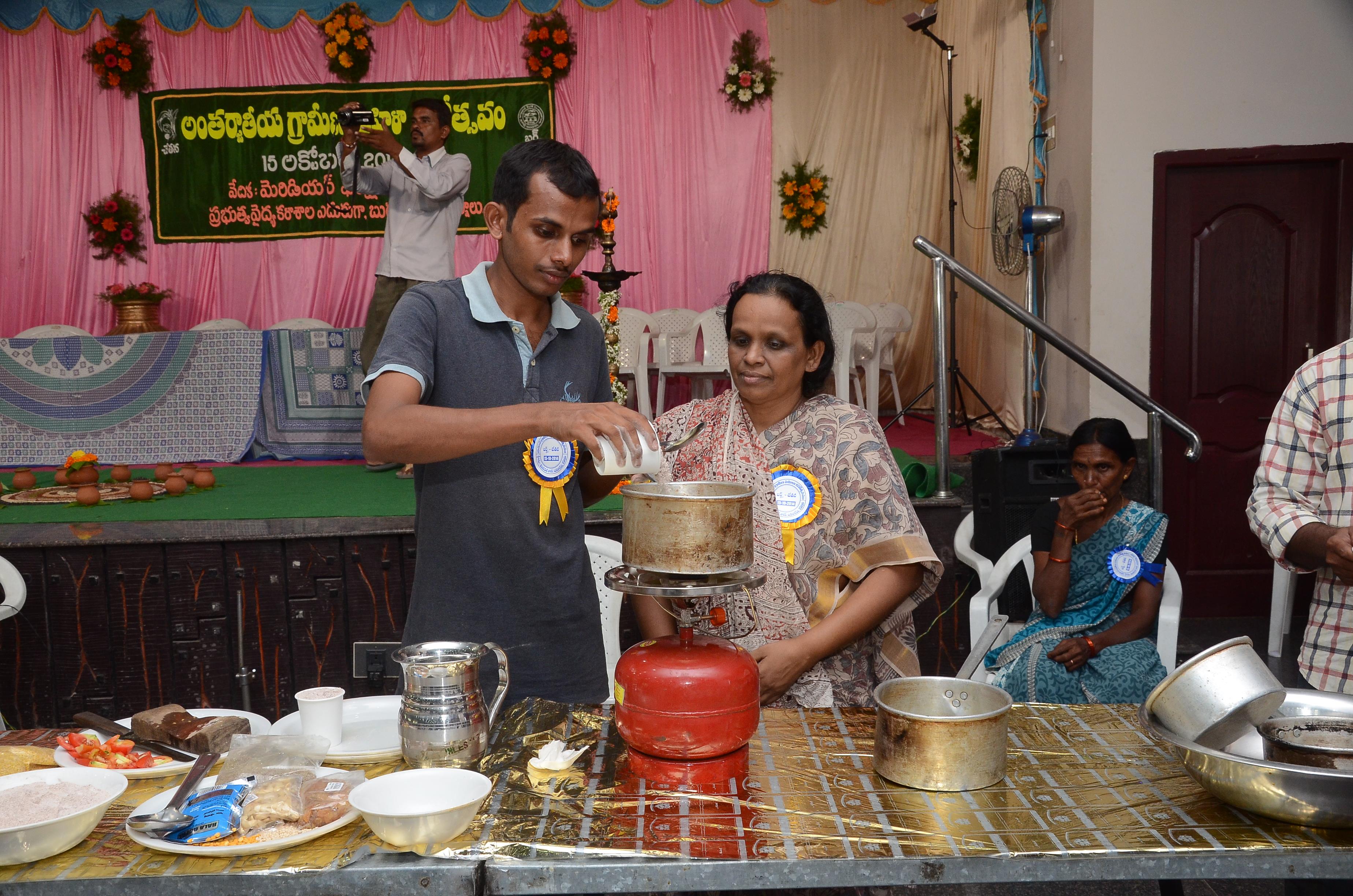By CG Jacob, CHETHANA, Joining Hands India

Cheerful women farmers at CHETHANA’s food festival. Photo courtesy of CHETHANA.
The relationship between food security and food production is a complex one, but food security is mainly a political problem. Food security requires that all people have physical, social and economic access to sufficient supply of diverse, safe and nutritious food throughout the year which satisfies their dietary needs and food preferences. But the myth that more chemicals and abusive biotechnologies will increase productivity and hence, reduce the number of people who go hungry – continues to drive agricultural policies worldwide and create enormous profit opportunities for corporations.
It is possible for the world’s poor to be fed through family farming practices with its use of traditional knowledge and local inputs, inclusion of women, and encouragement of biodiversity. In many regions, small farmers, engaging in family farming, are the main producers, yielding safe and nutritious foods for local communities. Food security requires that small farmers gain control of their land, seeds, farm produce and that they be empowered to make their own decisions, instead of relying on the whims of multi-national corporations like Monsanto, uplifted by state policies. Nevertheless, women produce up to 80% of food, but own little land and have access to less than 10 % of credit and extension services.
No one can be servant of two masters; for either he/she will hate the first and love the second, or he/she will be devoted to the first and think nothing of the second. You cannot serve God and Money (Matthew 6:24)
Hunger and poverty have existed in one form or another in every country since the birth of organized social life. Currently, there is a conflict between corporate-based modern farming and traditional knowledge-based “family farming” which can be understood as a conflict between the “economy of profit” and the “economy of giving*[i].”
What is the “Economy of Giving”?

A man and woman demonstrate the cooking of traditional foods. Photo Courtesy of CHETHANA.
The seed saver groups of CHETHANA are committed to an “economy of giving” through the sharing of traditional seeds, which results in the multiplication of what is offered by the giver and the fulfillment of needs. These seed saver groups have grown weary of an economic system and farming practices that privilege a few while compromising food security, rendering the earth sterile, destroying bio-diversity and polluting the environment with toxins.
Family Farming supports sustainable development and protects the ecosystem. Family Farms encourage crop-diversification and the use of traditional seeds and crops, contributing both to a balanced diet and agro-biodiversity. Family farms are embedded in local cultures, circulating money within local and regional markets, generating many agricultural and non-agricultural jobs. Local production and consumption based on family farming plays a major role in fighting hunger especially when linked to social protection that address the needs of vulnerable peoples.
Chethana, the Joining Hands network in India, works to help farmers to move towards complete self-reliance in seeds, farm inputs and safe food and thus achieve food security for posterity. Chethana organized a food festival on October 15-16, 2014, International Day of Rural Women and World Food Day. Wide varieties of seeds and traditional crops were displayed from different regions to facilitate their exchange among farmers. Seminars and discussions were held to share traditional farming knowledge, as well as traditional seeds and crop varieties that are on the verge of extinction, highlighting their importance to healthy living. Live demonstrations of traditional recipes from various parts of South India sharpened the culinary skills of visitors and generated much interest and respect for traditional foods.
[i] Concept of “Economy of Giving” comes from Father Sebastian Kappan’s book Jesus and Freedom
![]() You may freely reuse and distribute this article in its entirety for non-commercial purposes in any medium. Please include author attribution, photography credits, and a link to the original article. This work is licensed under a Creative Commons Attribution-NonCommercial-NoDeratives 4.0 International License.
You may freely reuse and distribute this article in its entirety for non-commercial purposes in any medium. Please include author attribution, photography credits, and a link to the original article. This work is licensed under a Creative Commons Attribution-NonCommercial-NoDeratives 4.0 International License.